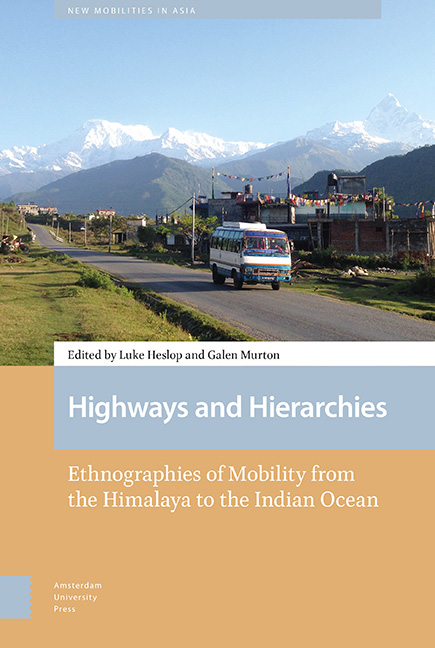Book contents
- Frontmatter
- Contents
- List of figures
- Acknowledgements
- Preface: Thinking with roads
- 1 Why highways remake hierarchies
- 2 Stuck on the side of the road: Mobility, marginality, and neoliberal governmentality in Nepal
- 3 A road to the ‘hidden place’: Road building and state formation in Medog, Tibet
- 4 Dhabas, highways, and exclusion
- 5 The edge of Kaladan: A ‘spectacular’ road through ‘nowhere’ on the India-Myanmar borderlands
- 6 The making of a ‘new Dubai’: Infrastructural rhetoric and development in Pakistan
- 7 Encountering Chinese development in the Maldives: Gifts, hospitality, and rumours
- 8 Roads and the politics of thought: Climate in India, democracy in Nepal
- Authors notes
- Index
4 - Dhabas, highways, and exclusion
Published online by Cambridge University Press: 13 November 2021
- Frontmatter
- Contents
- List of figures
- Acknowledgements
- Preface: Thinking with roads
- 1 Why highways remake hierarchies
- 2 Stuck on the side of the road: Mobility, marginality, and neoliberal governmentality in Nepal
- 3 A road to the ‘hidden place’: Road building and state formation in Medog, Tibet
- 4 Dhabas, highways, and exclusion
- 5 The edge of Kaladan: A ‘spectacular’ road through ‘nowhere’ on the India-Myanmar borderlands
- 6 The making of a ‘new Dubai’: Infrastructural rhetoric and development in Pakistan
- 7 Encountering Chinese development in the Maldives: Gifts, hospitality, and rumours
- 8 Roads and the politics of thought: Climate in India, democracy in Nepal
- Authors notes
- Index
Summary
Abstract
This chapter is an ethnographic study of ‘hybrid dhabas’ or inns that have emerged in the wake of massive highway construction all over India. Focusing especially on the dhabas on National Highways NH 1 and NH 37 passing through Murthal, Haryana, and Nagaon, Assam, this chapter argues that these hybrid dhabas, which combine features of traditional dhabas and city-based restaurants, reveal a particular social character of highways. These dhabas cater to a mostly middle-class clientele, while remaining inaccessible to less privileged classes and former users of highway inns, such as truck drivers. While scholars of urban studies have shown how material constructions such as shopping malls, theme parks, or gated communities give the city a middle-class character, this chapter shows how dhabas play a similar role in peri-urban areas by constructing the highways as middle-class spaces and sites of neoliberal exclusion.
Keywords: India, dhabas, class, exclusion, consumption
Introduction
A brightly lit two-storied building, signboard glowing in the dusk, and fairy lights hanging on the walls, Anurag dhaba is one of the swankier dhabas or highway inns that have come up on national highway NH 37 at the Nagaon bypass road in Assam since this highway stretch was upgraded. Owned by Mahendra Borah – a local from the Puronigudam village of Nagaon – and managed by his relative Rip Hazarika, the dhaba is segregated into two spacious compartments, one air-conditioned and the other with open windows (‘because not everybody likes AC, and closed rooms’), each with around six tables seating four, and a giant television at one end. The manager told me that around 60 staff work in this dhaba and claimed that its unique selling proposition (USP) is the authentic Assamese fare served by young women in traditional attire. With numerous such dhabas that have proliferated in recent years – six to seven dhabas at distances of 300 to 400 feet – the Nagaon bypass in this north-eastern state has entered the highway food map of India.
More than 2000 km away in Sonepat, Haryana, in the northern part of India, where my workplace is located, another highly popular eating spot is Murthal on NH 1 or the Grand Trunk Road, which has over 40 dhabas within a three-to-four-kilometre stretch.
- Type
- Chapter
- Information
- Highways and HierarchiesEthnographies of Mobility from the Himalaya to the Indian Ocean, pp. 97 - 124Publisher: Amsterdam University PressPrint publication year: 2021

